

-- The blasts hit the Port of Beirut at around 6:10 p.m. Tuesday, killing at least 100 people and injuring 4,000 others so far.
-- The causes of the blasts remained unknown, but Interior Minister Mohammad Fahmi said the 2,700 tons of explosive chemicals stored at Port of Beirut may have led to the explosions.
-- The explosions have dealt another huge blow to Lebanon, which is struggling to cope with the COVID-19 pandemic.
Two huge explosions rocked the Lebanese capital Beirut on Tuesday, killing at least 100 people and injuring 4,000 others in a toll that officials expect to rise.
The international community has expressed solidarity and sympathy with Lebanon over the deadly explosions as rescue workers continued their search for people missing under the rubble of collapsed buildings.
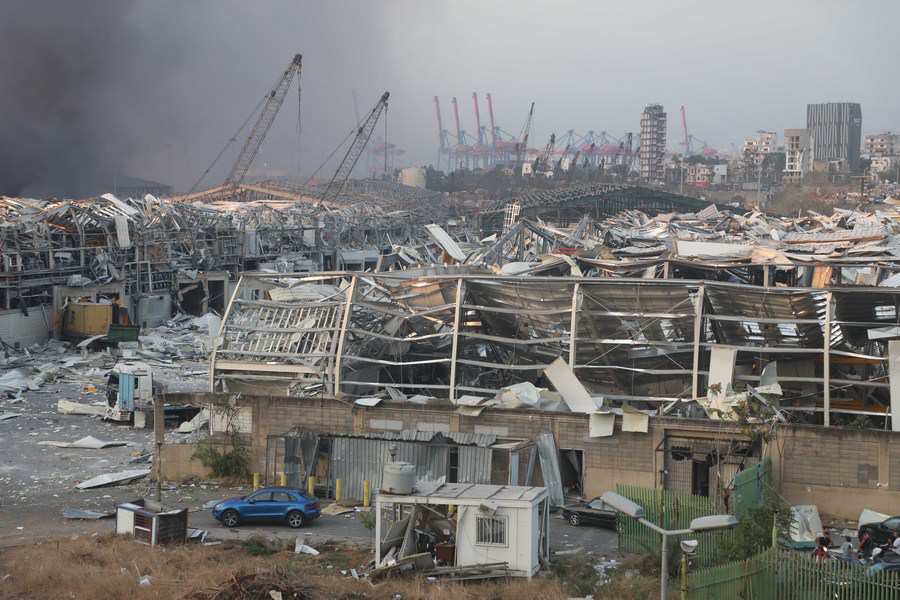
Damaged buildings are seen after the huge explosions at the port of Beirut, Lebanon, Aug. 4, 2020. (Xinhua/Bilal Jawich)
DEADLY EXPLOSIONS
The blasts hit the Port of Beirut at around 6:10 p.m. local time (1610 GMT), shaking buildings all over the city, shattering glass in most areas, damaging vehicles on the streets, while causing massive casualties and damage.
Hours after the explosions, the capital witnessed the Lebanese Red Cross and Civil Defense teams rushing to the site to rescue those buried in the rubble, ambulances shuttling between hospitals to deliver the injured, and local residents walking through the streets searching for relatives.
Local hospitals, having reached their capacity in a short time, urged the public to donate blood to save the injured.
Many of the injured are still without treatment, Lebanese Health Minister Hamad Hassan said.
The number of casualties is expected to rise as the counting continues. Local media outlets have been announcing the names of hundreds of people still missing, in the hope of helping their families find them.
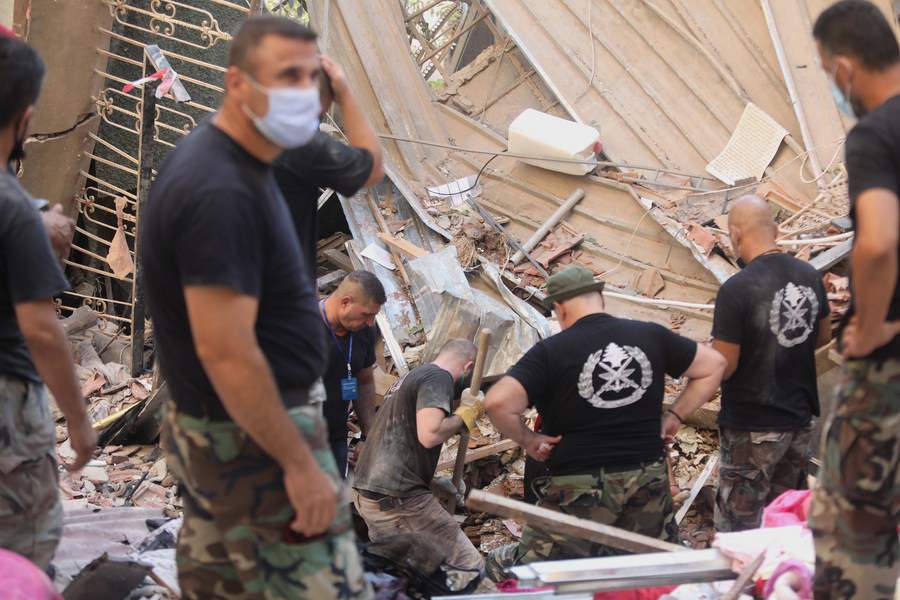
Rescuers search for survivors after the explosions in Beirut, Lebanon, Aug. 5, 2020. (Xinhua/Bilal Jawich)
The causes of the blasts remained unknown, but Interior Minister Mohammad Fahmi said the 2,700 tons of explosive chemicals stored at Port of Beirut may have led to the explosions.
"Customs authorities must be asked about the reasons behind storing such chemical materials at Port of Beirut," Fahmi said.
Investigations into the explosions are expected to reveal the real causes of the disaster within five days.
Following the explosions, Lebanese Prime Minister Hassan Diab immediately declared Wednesday a national mourning day for the victims.
President Michel Aoun also called an emergency meeting of the Higher Defense Council, which later on Tuesday urged the Lebanese cabinet to announce a state of emergency in the city for two weeks.
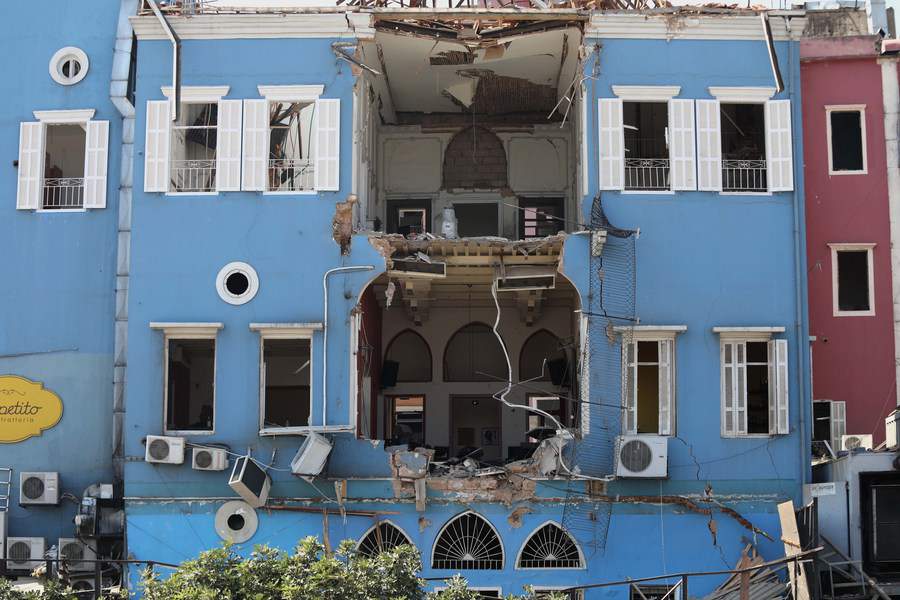
A damaged building is seen after the explosions in Beirut, Lebanon, Aug. 5, 2020. (Xinhua/Bilal Jawich)
The council also urged the cabinet to allocate funds for hospitals to help them treat the injured, and to contact all friendly countries to seek support and set up a fund to provide compensations for those affected by the disaster.
The Lebanese cabinet is expected to hold a meeting on Wednesday to look into the proposal by the Higher Defense Council and announce new measures to deal with the current crisis.
HELPING HANDS
United Nations Secretary-General Antonio Guterres on Tuesday sent his condolences to the families of the victims, adding the organization "remains committed to supporting Lebanon at this difficult time, and is actively assisting in the response to this incident."
World Health Organization spokesperson Inas Hamam told Russian media outlet Sputnik on Tuesday that the organization is sending trauma kits containing emergency medical supplies and surgery kits to Lebanon.
"Our hearts and prayers are with all those affected, and we continue our mission to ensure the wellbeing of all people in Lebanon and across the region," Hamam said.
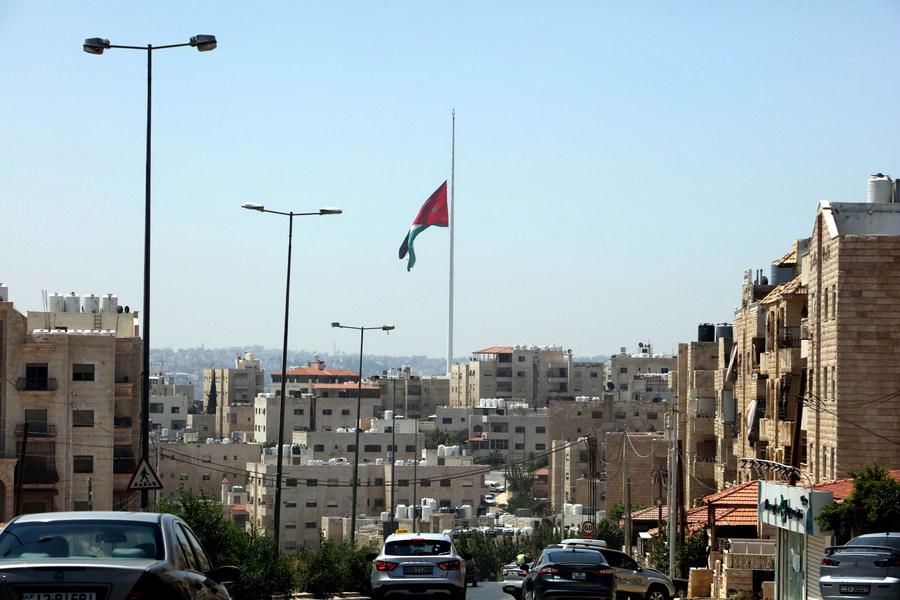
Jordanian national flag is seen at half-mast at Royal Hashemite Court, in Amman, Jordan, Aug. 5, 2020. Jordan's Royal Hashemite Court on Wednesday announced the national flag at its main entrance would be flown at half-mast for three days, mourning for the victims of the Beirut's explosions on Tuesday. (Photo by Mohammad Abu Ghosh/Xinhua)
Chinese President Xi Jinping sent a message of condolence to Aoun, extending profound condolences to the victims and conveying heartfelt sympathies to the bereaved families and the injured.
Al-Jadeed TV reported that Iraq and Qatar will send field hospitals to Lebanon on Wednesday, while French President Emmanuel Macron, in a phone call with Aoun, promised to send support for Lebanon on Wednesday.
In a rare move, Israel on Tuesday offered humanitarian aid to Lebanon over the explosions.
"Israel addressed Lebanon through international security and political elements and offered the Lebanese government medical humanitarian assistance," Israel's Foreign Ministry and Defense Ministry said in a joint statement.
Israel and Lebanon have no official ties and tensions have been rising on the Israel-Lebanon border recently.
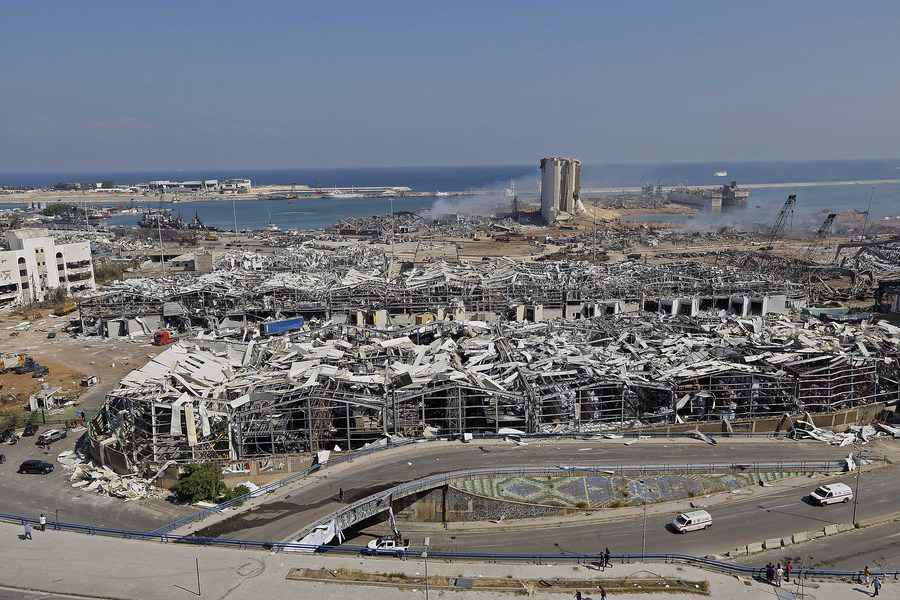
Damaged buildings are seen after the explosions at the Port of Beirut in Lebanon, Aug. 5, 2020. (Xinhua/Bilal Jawich)
GRAVE CONSEQUENCE
The explosions have dealt another huge blow to Lebanon, which is struggling to cope with the COVID-19 pandemic.
The Arab country, with a high population density of some 667 people per square km, has so far registered more than 5,000 COVID-19 cases, with over 60 deaths.
It reopened briefly on Tuesday for two days before starting another five-day lockdown in an attempt to restrict the spread of the virus.
Additionally, the economic slowdown in Lebanon, which has already prompted thousands of companies and businesses to shut down and caused high unemployment and poverty rates given the decreasing job opportunities, might also get much worse following the explosions.
According to a report in July by online independent newspaper Elnashra, the General Confederation of Lebanese Workers estimated that 150,000 Lebanese lost their jobs in 2020 amid the current economic deterioration.
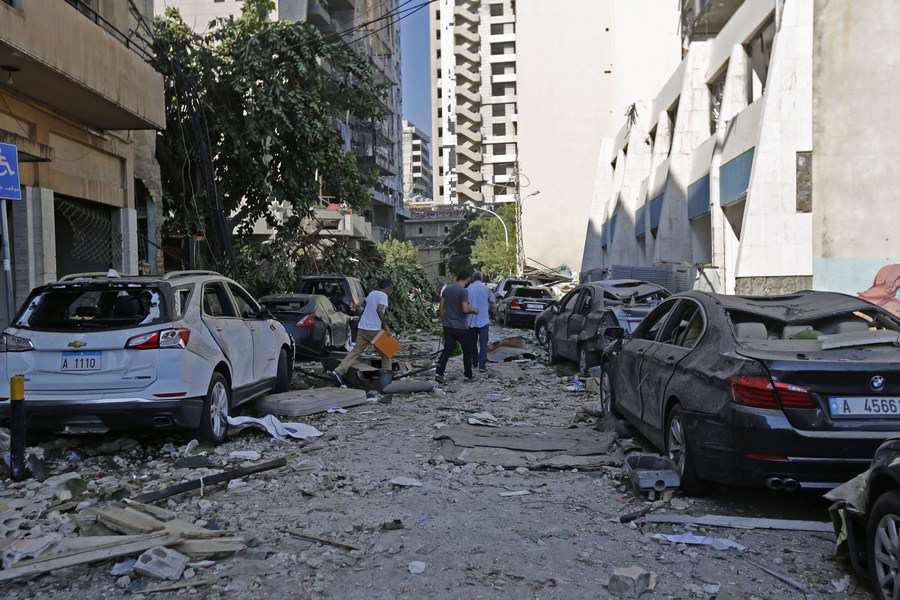
Damaged vehicles are seen after the explosions in Beirut, Lebanon, Aug. 5, 2020. (Xinhua/Bilal Jawich)
The Lebanese government has so far been incapable of implementing necessary reforms, including a forensic audit which will highlight the sources of money squandering in the country, to unlock international aid from the International Monetary Fund.
This has led to renewed nationwide protests against the government following the easing of anti-coronavirus measures.
While the international community is focusing on the rising number of the dead and injured in the explosions, concerns are growing over their effects on food security, as the blasts have flattened several ports in the capital, including the Port of Beirut, the country's largest, making it harder for Lebanon to import food, fuel and other much-needed supplies.
According to local media reports, Lebanon imports as much as 80 percent of its food needs and relies heavily on imported soft wheat.
The country's major grain silo in the capital was also damaged, and all the wheat stored at the facility has been "contaminated," Lebanon's state-run National News Agency quoted Minister of Economy and Trade Raoul Nehme as saying.

 Award-winning photos show poverty reduction achievements in NE China's Jilin province
Award-winning photos show poverty reduction achievements in NE China's Jilin province People dance to greet advent of New Year in Ameiqituo Town, Guizhou
People dance to greet advent of New Year in Ameiqituo Town, Guizhou Fire brigade in Shanghai holds group wedding
Fire brigade in Shanghai holds group wedding Tourists enjoy ice sculptures in Datan Town, north China
Tourists enjoy ice sculptures in Datan Town, north China Sunset scenery of Dayan Pagoda in Xi'an
Sunset scenery of Dayan Pagoda in Xi'an Tourists have fun at scenic spot in Nanlong Town, NW China
Tourists have fun at scenic spot in Nanlong Town, NW China Harbin attracts tourists by making best use of ice in winter
Harbin attracts tourists by making best use of ice in winter In pics: FIS Alpine Ski Women's World Cup Slalom
In pics: FIS Alpine Ski Women's World Cup Slalom Black-necked cranes rest at reservoir in Lhunzhub County, Lhasa
Black-necked cranes rest at reservoir in Lhunzhub County, Lhasa China's FAST telescope will be available to foreign scientists in April
China's FAST telescope will be available to foreign scientists in April